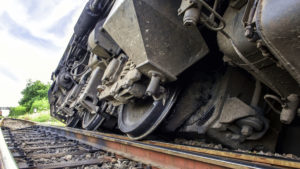Tampa Train Accident Lawyer
Whether you’re a train passenger, a pedestrian, or a vehicle occupant, trains pose a serious threat to your safety. According to the Federal Railroad Administration, there has been an average of almost 1,700 passengers involved in fatal train accidents per year over the last decade. When looking at the number of train accidents by state, Florida is #6 in the nation for highway/rail grade crossing accidents.

What are the Most Common Causes of Train Accident Injuries?
Just as there are many different types of train accidents, there are also numerous factors that can go into the cause of a train accident. Some of the most common causes of train car accident injuries for those who are not railroad employees or contractors include:
- Pedestrian and vehicles on the tracks
- Derailment of passenger cars
- Malfunctioning safety rails, guards, and other train features
- Unsecured luggage
- Passengers lurching forward as a train performs an emergency stop
- Hazardous conditions on train platforms
I was Injured in a Train Accident. What Should I do?
Seek appropriate medical attention immediately. If you are unable to use your cell phone, look for passengers around you or the train’s conductor for assistance. In most cases, train accidents will be affecting passengers other than yourself as well, so first and foremost follow the directions being broadcast and remain calm.
I am a Railroad Employee Injured in a Train Accident. Can I Sue?
Despite extensive safety measures in place for railroad employees, it’s still a dangerous job. According to the Bureau of Transportation, over the last decade, an average of 16 railroad employees die each year from train accidents. Additionally, there are nearly 4,700 injuries reported each year. If you’ve been injured on the job due to someone else’s negligence, we encourage you to reach out to a train accident lawyer to discuss your case.
Do I Need a Train Accident Lawyer?
Once your medical needs have been attended to, you can explore your legal options. If you have been injured in a train accident, you are entitled to sue the parties responsible for your injury, including the railroad company, which is legally obligated to ensure the safety of its passengers.
Both regular train commuters and employees of the railroad company, through the Federal Employers Liability Act (FELA), are allowed to file claims. In fact, as an employee protected by FELA, negligence on the part of the railroad company is generally easy to establish if your injury can be associated with the accident.
I was Injured While Crossing Train Tracks. What should I do?
In this case, you must produce proof that the railroad crossing at which your injury took place was improperly maintained at the expense of safety, that the operator of the train was irresponsible in his or her management of the crossing, or that the signage, warning lights, and/or fencing perimeters were inadequate in reflecting and guarding against the danger of oncoming traffic. If any of these burdens of proof can be met, you can establish negligence on the part of the railroad company.
Even if blame can be attributed to you as a driver or pedestrian, such as a failure to stop before a crossing absent a clearly marked stop sign or walking through a flashing crossing gate in front of a seemingly stopped train, you can still argue that the railroad company demonstrated partial negligence by lack of clarity in signage or signaling. However, your settlement will likely reflect the degree to which you were determined negligent.
How Much is My Train Accident Case Worth?
It depends, of course, on the nature of the accident and of your role in the accident. Upon the accident, the railroad company will have summoned a legal defense of its own and will make the case against its negligence. Your attorney will be responsible for summoning expert testimony to counter these arguments from the defendant.
In order to get an accurate sense of the worth of your case, you must also make a case for the damages personally suffered after your accident. These damages can include medical costs, time spent in the hospital, physical and emotional trauma, time off of work, and any other ongoing difficulties.
Once you have given as much clarifying detail as can be provided, your attorney can assess how much you may be entitled to in compensation. If you choose to pursue legal recovery, settlement out of court is the likeliest option; in the event that your case moves to trial, it is still likelier than not that the case will settle at some point in the process of trial.
How Much Will Legal Fees for a Train Accident Lawyer Cost?
We offer free initial consultations; we also work on a contingency basis, meaning that you will not incur any legal fees unless and until we are able to secure a legal victory for your case. These terms will appear in writing in a contract signed by you and your attorney. In the event that a settlement is reached, your legal fees will be folded into your recovery. You can get the answers you need right away. Call us at (813) 774-3341 for a complimentary, no-obligation consultation right over the phone or contact us to schedule a Zoom meeting.
